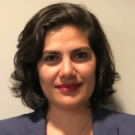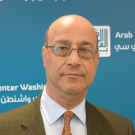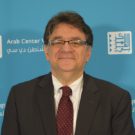Speakers

Holly Dagres
Nonresident Fellow and IranSource Editor
Atlantic Council

Negar Mortazavi
Political Analyst and Columnist for The Independent
Moderator
Event Summary
On December 2, 2020, Arab Center Washington DC (ACW) held a webinar titled “US Policy toward Iran: Escalation vs. Diplomacy.” Panelists were Holly Dagres, Nonresident Fellow and IranSource Editor at the Atlantic Council, Imad K. Harb, ACW Director of Research and Analysis, Negar Mortazavi, Political Analyst and Columnist for The Independent, and Daniel Brumberg, Professor and Director of the Democracy and Governance Program at Georgetown University. ACW Executive Director Khalil E. Jahshan moderated the event.
Holly Dagres presaged her presentation by reminding the audience that the Joint Comprehensive Plan of Action (JCPOA), or the Iran nuclear deal, was strictly limited to nuclear proliferation measures and excluded regional issues. This was used by the Trump Administration as a reason to withdraw from the deal, negotiate a better and more comprehensive one, and introduce a “maximum pressure campaign” on Iran. Dagres said that the demands of the campaign were so unrealistic that many thought the real goal was regime change through “economic collapse” in Iran. However, she said, the effects of the maximum pressure campaign have first and foremost hurt the Iranian people. Dagres stated that Iran became even more aggressive, started developing its ballistic missile program, and increased its defense spending.
Nevertheless, Dagres pointed out that the Trump Administration is still trying to sell the “maximum pressure” campaign as a successful policy. She added that President Trump is attempting to block the incoming Biden Administration from reentering the nuclear deal by further escalating tensions with Iran; to wit, he vowed after the election to impose a new round of sanctions every week until he leaves office. Dagres concluded by stating that although the Trump Administration continues to portray the “maximum pressure” campaign as a massive success, in reality it is “a maximum failure campaign that reeks of desperation.”
Addressing the regional dynamics influencing the Iran-US confrontation, Imad K. Harb emphasized Israel’s crucial role in shaping US policy toward Iran. He explained that Israel’s overriding concern about Iran’s nuclear capabilities is a driving force for the “maximum pressure” campaign on the Islamic Republic. Harb argued that Israel is hoping to keep Iran perpetually on the defensive to deter its leaders. The problem, he said, is that the latter has never happened. Harb also suggested that the current approach perpetuates a system in which US interests are compromised in favor of the national security concerns of Israel. Harb also said that Israel is attempting to divert attention from its own decades-long colonization of Palestinian lands and by trying to convince the Arab world that Iran is a threat, not Israel. Israel’s recent moves to normalize relations with the UAE and Bahrain are also part of this strategy of uniting against a mutual enemy, he argued.
Harb said that the Gulf Arab states have no monolithic stance or approach to Iran. The Qatar crisis has surely colored these divisions; while the UAE, Saudi Arabia, and Bahrain claim to be at odds with Iran, countries such as Qatar, Oman, and Kuwait wish to avoid any conflict with the Islamic Republic, he said. Harb also pointed to the contradictions inherent in a unified Gulf-Israel position on Iran such as the differing views regarding the Palestine question and the fact that Arab public opinion considers Israel and the United States to be the greater threat to regional security than Iran.
Negar Mortazavi explained the political motivations for what has been suspected to be Israel’s recent assassination of Iranian nuclear scientist Mohsen Fakhrizadeh Mahabadi in Tehran, saying it complicates US diplomacy with Iran. However, she emphasized that the “time for diplomacy” between the United States and Iran is now, saying that Washington and European capitals should have a sense of urgency after the assassination. She added that recent provocations by the United States have further empowered Iran’s hard-liners at the expense of moderates and reformists who would be more inclined to pursue diplomacy with the West.
Mortazavi pointed out that a hard-line president is expected to win the upcoming elections next June, which would make diplomacy more difficult unless President-elect Joe Biden prioritizes negotiations in the narrow window of opportunity he has after he takes office. If diplomacy is pursued, she stressed, Iran may be willing to enter an expanded version of the JCPOA, though only if it would result in substantial improvements in the Iranian economy. Still, she said, there are many “ifs” about an easy return to the deal. Mortazavi also cautioned that nearly a decade of more hostility may ensue if hard-liners indeed make gains in the upcoming elections.
Daniel Brumberg began by noting that the assassination of Mohsen Fakhrizadeh Mahabadi actually reflected the limits to President Donald Trump’s efforts to cement long-term policy goals before President-elect Joe Biden takes office. He said that although Iran has limited options to respond to provocations, it is expected to retaliate in some form, which may prompt the outgoing US president to transfer his “slash and burn” approach in domestic politics to foreign policy. He noted that Biden has indicated that he would like to keep the option of pursuing diplomacy; in addition, Brumberg cited the Iranian leadership’s assertion that Iran will not be drawn into a US or Israeli “trap.” Brumberg emphasized the fact that even Iran’s hard-liners do not necessarily want a violent conflict; instead, he stated, they will continue to “champion the resistance” but are not willing to incur the costs of war with either the United States or Israel.
On the choice of diplomacy, Brumberg said that if it is to be pursued, the issue of sanctions—especially on Iran’s oil sector—would need to be addressed in a mutually suitable fashion. He added that it would be perilous for Iran to revive its now-defunct nuclear weapons program, saying that Iran’s increase in uranium enrichment is in fact an effort at strengthening its bargaining power with the West. Despite the complications facing diplomacy, Brumberg noted that he expects it will occur behind the scenes if it is not already underway.



